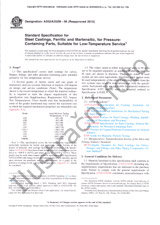Potřebujeme váš souhlas k využití jednotlivých dat, aby se vám mimo jiné mohly ukazovat informace týkající se vašich zájmů. Souhlas udělíte kliknutím na tlačítko „OK“.
ASTM D464-15(2020)
Standard Test Methods for Saponification Number of Pine Chemical Products Including Tall Oil and Other Related Products
Přeložit název
NORMA vydána dne 1.6.2020
Informace o normě:
Označení normy: ASTM D464-15(2020)
Poznámka: NEPLATNÁ
Datum vydání normy: 1.6.2020
Kód zboží: NS-997592
Počet stran: 3
Přibližná hmotnost: 9 g (0.02 liber)
Země: Americká technická norma
Kategorie: Technické normy ASTM
Kategorie - podobné normy:
Anotace textu normy ASTM D464-15(2020) :
Keywords:
rosin, saponification number, tall oil, tall oil fatty acids,, ICS Number Code 87.060.20 (Binders)
Doplňující informace
| Significance and Use | ||||||
|
3.1 These test methods are designed to broaden the scope of the earlier editions of the test method by the inclusion of tall oil and tall oil derived products as test materials and is referenced in Test Methods D803. 3.2 The saponification number is an important property of tall oil and the products obtained by the fractionation of tall oil. It is the test method widely used to determine the total acid content, both free and combined, of these products. 3.3 The potentiometric test method should be used when the most reproducible results are required. |
||||||
| 1. Scope | ||||||
|
1.1 These test methods cover the determination of the saponification number of tall oil and products obtained by the fractionation of tall oil such as rosin, fatty acids and distilled tall oil as defined in Terminology D804. These test methods are also applicable to gum and wood rosin. Two test methods are covered as follows: 1.1.1 Test method using a potentiometric method, and 1.1.2 Test method using an internal indicator method. 1.2 The potentiometric method is suitable for use with both light- and dark-colored test samples. It should be considered the referee method. The internal indicator method is suitable for use only with light- and medium-colored test samples. It should be considered the alternate method. 1.3 The values stated in SI units are to be regarded as standard. No other units of measurement are included in this standard. 1.4 This standard does not purport to address all of the safety concerns, if any, associated with its use. It is the responsibility of the user of this standard to establish appropriate safety, health, and environmental practices and determine the applicability of regulatory limitations prior to use. 1.5 This international standard was developed in accordance with internationally recognized principles on standardization established in the Decision on Principles for the Development of International Standards, Guides and Recommendations issued by the World Trade Organization Technical Barriers to Trade (TBT) Committee. |
||||||
| 2. Referenced Documents | ||||||
|




 Cookies
Cookies
